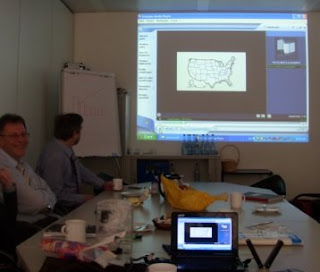I was browsing around in youtube last night and came across a video from a Columbian youth.
The question was so poignant I immediately knew it would make a great lesson.
Today in Davos, the World Economic Forum begins. To support their activities, other than their website, the WEF have also created an interactive page on youtube for questions and lectures on a number of topics including economy, ethics, environment and politics.
Pablo's answer to the question Should CEOs have a code of ethics was:
I know I'm 100% for this idea, my feelings are "about time" -but what do our business English students think?
The question was so poignant I immediately knew it would make a great lesson.
Today in Davos, the World Economic Forum begins. To support their activities, other than their website, the WEF have also created an interactive page on youtube for questions and lectures on a number of topics including economy, ethics, environment and politics.
Pablo's answer to the question Should CEOs have a code of ethics was:
You can download the video from here.
Not sure how to take it into class, come here.
Not sure how to take it into class, come here.
I know I'm 100% for this idea, my feelings are "about time" -but what do our business English students think?
Here's a quick lesson plan - don't hesitate to add to it or suggest other uses for these rich and interesting discussions.
- ask students if they know what a "code of ethics" is
- get them to list professions that have one
doctors, psychologists, lawyers, journalists, social workers and more
- write on the board - Should CEOs have a code of ethics? Ask why, why not?
- watch the video (possibly more than once depending on your students' levels)
- review some of the more difficult vocabulary* (see below, you could also pre-teach)
- hold a discussion on the suggestions he makes, feasible?
Quite long: you can split these up into parts or only use some of it,
do a google search for others if you have a large class. Different codes to different students.
do a google search for others if you have a large class. Different codes to different students.
- provide this guideline on creating a code of ethics, c.o.e. (or adapt)
- get students to brainstorm a new code specifically for CEOs in groups
- encourage them to use some of the 'legal-speak' they've picked up so far
- monitor slightly, remind them of the modals of obligation
- choose a presenter from each group to relay their c.o.e, edit as necessary
- discuss the pros and cons of their suggestions
Important vocabulary
- to be contingent on, to standardize, to compromise
- unethical liberties, human rights, common characteristics, profit-driven
- an international code, international markets
Post-task activity
Let your students choose between watching further videos on youtube, listening to podcasts or reading articles, blog postings etc on the WEF and ask them to report back on their activities next week (or next lesson(s)).
 You could also ask them to research the people present or behind the scenes. Alternatively, you can also ask your students to look into the history of the Forum and the location chosen.
You could also ask them to research the people present or behind the scenes. Alternatively, you can also ask your students to look into the history of the Forum and the location chosen.
Or, if you're lucky enough to be teaching a group with great technology skills, teens /youth perhaps, why not get them to make video responses on their cameras or camera phones and actually participate in the debates - such fun!
 You could also ask them to research the people present or behind the scenes. Alternatively, you can also ask your students to look into the history of the Forum and the location chosen.
You could also ask them to research the people present or behind the scenes. Alternatively, you can also ask your students to look into the history of the Forum and the location chosen.Or, if you're lucky enough to be teaching a group with great technology skills, teens /youth perhaps, why not get them to make video responses on their cameras or camera phones and actually participate in the debates - such fun!
Best,
Karenne
p.s don't forget you can .pdf this page or send it to yourself/ a friend. Buttons below.


































